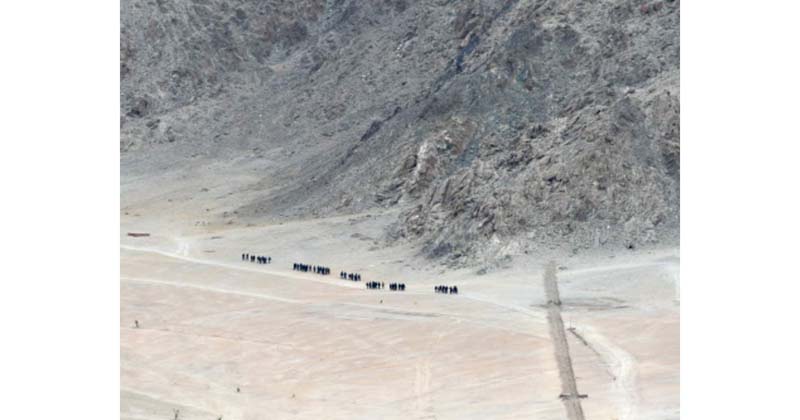NEW DELHI, June 25: China has been amassing a large contingent of troops and armaments along the LAC in Eastern Ladakh since early May, India said today, and warned that continuation of the current situation would only vitiate the atmosphere for the development of the relationship.
Click here to watch video
This is for the first time since the military standoff began in early May, India has officially admitted about the Chinese buildup along the Line of Actual Control (LAC).
In a strongly-worded statement, External Affairs Ministry spokesperson Anurag Srivastava said conduct of the Chinese forces is in “complete disregard” of all mutually agreed norms.
At an online media briefing, he also gave a detailed run down of the events along the LAC in the Eastern Ladakh, and said Chinese side was responsible for the Galwan valley clashes on June 15.
India expects China to sincerely “follow up” on the understanding arrived at between two sides on disengagement of troops to ensure expeditious restoration of peace and tranquility in the border areas, he said.
“At the heart of the matter is that since early May, the Chinese side has been amassing a large contingent of troops and armaments along the LAC. This is not in accordance with the provisions of our various bilateral agreements,” the spokesperson said.
“A continuation of the current situation would only vitiate the atmosphere for the development of the relationship,” he asserted.
The unusually strong attack by the MEA spokesperson against China came a day after Chinese foreign ministry as well as the defence ministry held India responsible for the Galwan valley clash, even accused the MEA of spreading false information about the incident.
The Chinese foreign ministry on Wednesday also accused the MEA and the Indian media of making “some false reports” during the border tensions.
Srivastava said both the India and Chinese sides remain deployed in large numbers in the Galwan valley region.
Indian and Chinese troops are engaged in a standoff in various areas in eastern Ladakh for the last six weeks. The tension escalated after 20 Indian soldiers were killed in the Galwan valley clashes on June 15. Referring to the 1993 Agreement on the Maintenance of Peace and Tranquility along the Line of Actual Control in the India-China Border Areas, Srivastava said it mentions that each side will keep its military forces in the areas along the LAC to a minimum level.
The deployment of “large body of troops” and “changes in behavior” by Chinese side has also been aggravated by “unjustified and untenable claims”, the spokesperson said, adding “the recent shift in the Chinese position on the Galwan valley is one example.”
“Obviously, the Indian side had to undertake counter deployments and the resulting tension has thereafter expressed itself,” he said.
He said a set of procedures and norms have been mutually agreed upon in conducting patrolling in border areas which are reflected in a number of agreements and understandings.
“While there have been occasional departures in the past, the conduct of Chinese forces this year has been in complete disregard of all mutually agreed norms,” the MEA spokesperson said.
In early May, he said, the Chinese side took action to hinder India’s “normal, traditional” patrolling pattern in the Galwan Valley area while it sought to change the status quo in other areas of the Western Sector in mid-May.
“We had registered our protest on the Chinese actions through both the diplomatic and military channels, and made it clear that any such change was unacceptable to us,” he said.
Subsequently, the senior commanders met on June 6 and agreed on a process for de-escalation and disengagement along the LAC that involved “reciprocal actions”, he said.
Srivastava said both sides had agreed to respect and abide by the LAC and not undertake any activity to alter the status quo.
“The Chinese side departed from these understandings in respect of the LAC in the Galwan Valley area and sought to erect structures just across the LAC,” he said.
“When this attempt was foiled, Chinese troops took violent actions on June 15 that directly resulted in casualties. Thereafter, both sides remain deployed in large numbers in the region, while military and diplomatic contacts are continuing,” he added.
The MEA spokesperson said respecting and strictly observing the LAC is the basis for peace and tranquility in the border areas which was explicitly recognised in the 1993 and subsequent agreements.
He said Indian troops are fully familiar with the alignment of the LAC in all sectors of the India-China border areas and abide scrupulously by it.
“They have been patrolling all along the LAC, including in the Galwan valley, for a long time. All infrastructure built by the Indian side has always been on its own side of the LAC,” he said.
“The Indian side has never undertaken any actions across the LAC and has never attempted to unilaterally change the status quo. However, that has not been reciprocated by the Chinese side and that from time to time has led to face-offs,” Srivastava added.
The meeting of the Working Mechanism for Consultation and Coordination on India-China Border Affairs (WMCC) yesteday was a significant development, he said.
It was preceded by a discussion among senior military commanders on June 22 that focused on implementation of the understandings reached between them on June 6, he said. (PTI)


